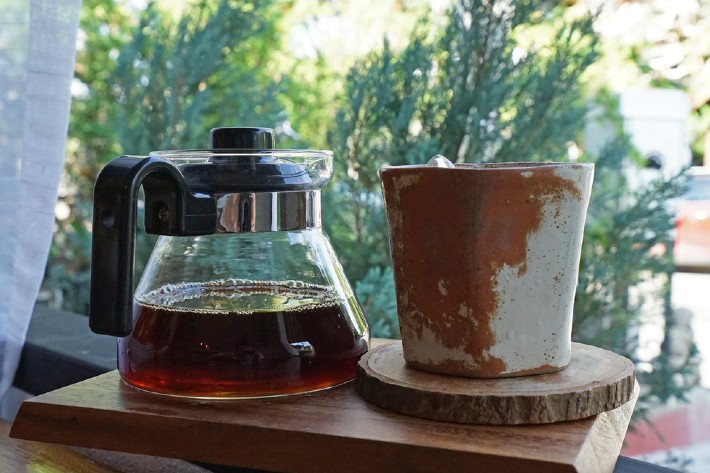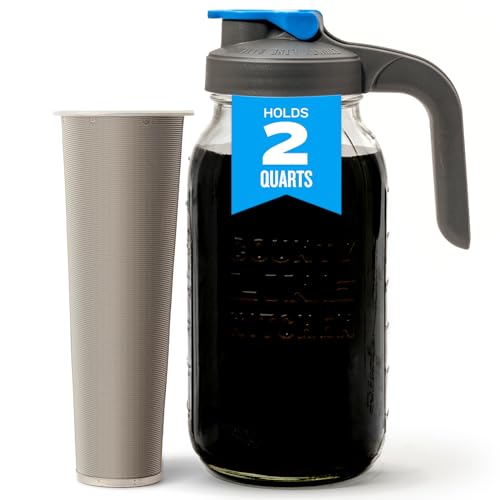
Takeya Cold Brew Coffee Maker
| Pros | Cons |
|---|---|
|
|
Our content is meticulously curated through independent research, testing, reviews, and AI-driven recommendations, all designed to present you with the finest product choices. When you make a purchase through our links, it could result in us earning a commission.

If you're a coffee lover seeking a light, flavorful, and healthier alternative to hot
brews, cold brew coffee is your new best friend. Renowned for its rich,
low-acidity taste and natural sweetness, cold brew is perfect for hot summer
days or a refreshing pick-me-up anytime. Join us as we explore the
top-rated cold brew coffee makers of 2024, starting with this option from County Line Kitchen. It is our best overall pick thanks to its Mason jar design and durable filter. All of our options are ready to serve up a delicious cup of cold brew, so check them out!
As a coffee-lover, you know that nothing can quite compare to the pleasurable experience of a good, cold brew. The subtle sweetness, the perfect hint of acidity: it's like the platonic ideal of coffee. However, buying a cold-brew coffee maker to make this delicious concoction can be a daunting task. To make it easier for you, we've prepared a handy guide that'll help you pick the right product with ease. Let's take a look!
The material of the brewer matters in more ways than one. Firstly, it determines the quality of your cold brew and how long it will last. Additionally, the material will also determine how easy or hard it is to clean your brewer. The most common materials used in making brewers are steel, glass, and plastic. Plastic brewers are often leakproof and lightweight but will influence the taste of your beverage. Glass brewers are very easy to clean but can be fragile if mishandled or dropped on the floor accidentally. Steel brewers are sturdy and long-lasting but cannot handle drastic temperature fluctuations. If you want a durable brewer with amazing insulation properties, opt for one made of borosilicate glass. Borosilicate glass is known for its lightweight and heat-resistant properties. It can handle both hot and cold temperatures without getting damaged. This means that you can use it to make hot brews as well as iced coffees with ease.
The capacity of the cold brew maker will depend on the number of people who drink coffee in your home and their consumption frequency. If you only plan on making 1-2 cups of cold brew a day, then an immersion brewer or individual serving pitcher might be the best option for you. But if your whole family loves this concoction and you find yourself brewing gallon after gallon all summer long, you should opt for one with a generous 64 oz capacity that allows you to make more than 5 cups at a time.
If you want to enjoy great quality coffee, then the type of filter matters a lot. Conventional filters have tiny holes through which water passes slowly, making the whole brewing process a chore. Paper filters have larger holes and make brewing faster but also leave lots of residue in your cup that interferes with the taste. The reusable fine mesh filters are the best option because they do not leave any residue behind, and you get crystal-clear coffee without any impurities or acidity.
Cold-brew machines are not cheap, but the price is often offset by the difference in quality you can achieve with a cold-brew system. The most basic and affordable type of cold brew machine is a pitcher or jug with a built-in filter that can strain out the coffee grounds after steeping. Some machines even come with alligator clips that let you customize their usage according to your needs. On average, these machines cost between $20–$50 and will serve their purpose well without burning a hole in your pocket. On the other end of the spectrum are industrial-sized commercial cold brewers that cost upwards of $1,000 or more. These systems include specialized equipment like refrigeration units or tanks for storage, pumps, and hoses for transferring coffee concentrate. These brewers are designed for high-volume production and often aren't ideal for home use.
Cold-brew coffee machines are the best way to prepare a delicious, super-caffeinated cup of joe that you can enjoy any time of day. However, without regular cleaning, you'll find that your cold brew maker fails to function as well as it used to and might even start producing coffee with an odd taste. To prevent this from happening, clean your cold brew maker immediately after each use. This way, you'll never have to deal with coffee buildup or stale beans making their way into a new batch of coffee. Follow these steps to keep it in optimal condition:
This may seem like a lengthy process but trust us when we say that taking extra care when cleaning your cold brew machine will go a long way toward ensuring that you enjoy its benefits for many batches of delicious, iced coffees in years to come.

| Pros | Cons |
|---|---|
|
|

| Pros | Cons |
|---|---|
|
|

| Pros | Cons |
|---|---|
|
|

| Pros | Cons |
|---|---|
|
|

| Pros | Cons |
|---|---|
|
|